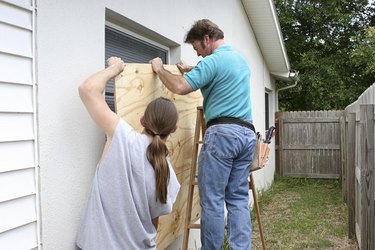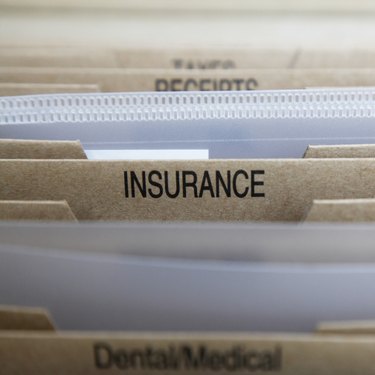
Disaster wears many faces. It can be a hurricane, a flash flood, a fire in your home, a terrorist attack or a financial crisis. Surviving and thriving during adverse events takes more than a vague idea of "doing something, going somewhere and waiting for the government to take care of me." Surviving a disaster takes planning and preparation.
Personal Preparation
Video of the Day

A disaster is any event that swamps a community's or individual's ability to cope and respond. During an emergency, all levels of government may be overwhelmed with managing the crisis. Government help may not reach you and your family for days. Being able to meet your basic needs for at least a week is a sensible course of action.
Video of the Day
Meeting Needs

The immediate needs of you and your family are air to breathe, water to drink, a warm and secure place to stay, nutritious and easy-to-prepare food to eat, and the ability to stay in contact with others. Stocking up on face masks like the N100, storing at least one gallon of water per day per person for a week or more, having the materials and skills to repair a damaged roof, maintaining enough nonperishable canned and packaged food and the means to prepare it, and keeping your cell phone charged at all times can work wonders in making life bearable and safe until help arrives.
Financial Matters

Financial preparation is an area sometimes overlooked. Maintain adequate levels of insurance on your possessions and on yourself in case your family needs to continue without you. Have spare cash on hand, enough to operate for a week or more. ATMs will not work without electricity, leaving you without funds. Point-of-sale cash registers won't work for the same reason. Make sure you have a stash of small bills and coins because store owners will be unable to give you change.
Home Communications

Establish a safe rallying point outside of your home where all family members can meet in case your home is uninhabitable or you can't make it back. Call a family member or friend who lives out of state to let them know you're all right. Local phone lines may be swamped and it is often easier to contact someone in a different state because of the way phone traffic is switched and routed. Consider keeping your landline telephone in case of an emergency, because cell towers are often swamped with traffic or may sustain damage in a disaster.
News from the Outside

Being able to access information during and after a disaster can give you peace of mind and help you avoid more danger. Internet access may not be available if the power goes off or if regional servers are not in service. A battery- or solar-powered multi-band radio will provide you with information when there is no electricity.